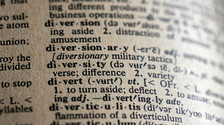Mia
片付けます vs 片付きます
What are the differences between 片付けます or 片付きます? Is it like a passive and active form?
2019年6月23日 04:06
解答 · 8
1
*** 片付けます・片付ける is a transitive verb.
e.g.
仕事 を 片付ける = to get the job done; to complete the work
部屋 を 片付ける = to put the room in order; to clean up the room
*** 片付きます・片付く is an intransitive verb.
e.g.
仕事 が 片付く = The work gets done. The work is completed.
部屋 が 片付く= The room is put in order. The room is cleaned up.
2019年6月23日
It's just a matter of what is the subject. The one of the former is usually a person, the one of the latter is usually a thing.
2019年6月23日
It is a matter of preference, however, in my tentative opinion, I think Kanji-san's answer is more appropriate and useful in the end. Because the best answer here saying "It is all about the matter of the subject", explains "the effect" part of "cause-and-effect" while Kanji-san's explains "the cause" part.
Why "the one of the former is usually a person"? It is because 片付ける is a transitive verb. And why "the one of the latter is usually a thing"? It is because "片付く“ is an intransitive verb.
I understand that "simple conclusion without reason" style of the answer is sometimes more fascinating for leaners at a beginner level. I believe, however, it won't work in the end when you get into middle level.
For example.
ーーー 片づける
お掃除ロボット(a machine/ a thing)が部屋をキレイに片付けてくれた!
魔法のほうきがお部屋をキレイに片付けてくれた!
このひどい計画(a plan )が、俺達の夢をすべてどこかへ片付けてしまった。
(It is a English-translation-like Japanese, but it is grammatical and works)
or
ーーー 片づく
ウチの娘( a person) もやっと片付いたよ (Finally, she got married)
Or you cannot understand 加える and 加わる with "thing-person subject" method.
(くわえる)
私たち(person)は、あらたに一名、田中さんを新メンバーとして加えた。
(くわわる)
田中さん(person)が、新しいメンバーとして加わった。
But those lines can easily be understood by "transitive-intransitive" theory. I am sure the logic will take you further.
2019年6月24日
The former is a transitive verb and the latter is an intransitive verb.
2019年6月23日
Deleted and moved to Answers.
2019年6月23日
還沒找到你要的答案嗎?
寫下你的問題,讓母語者來幫助你!
Mia
語言能力
中文, 中文 (廣東話), 中文 (客家話), 中文 (閩南語), 英語, 日語, 韓語, 馬來語, 俄語, 西班牙語
學習語言
日語, 俄語, 西班牙語
你也許會喜歡的文章

Top 6 Mistakes to Avoid with Vocabulary Acquisition
39 讚 · 10 留言

Navigating Your First Job: Do's and Don'ts in the Workplace
47 讚 · 21 留言

What Content to Watch to Acquire Advanced-level Proficiency
79 讚 · 50 留言
更多文章
